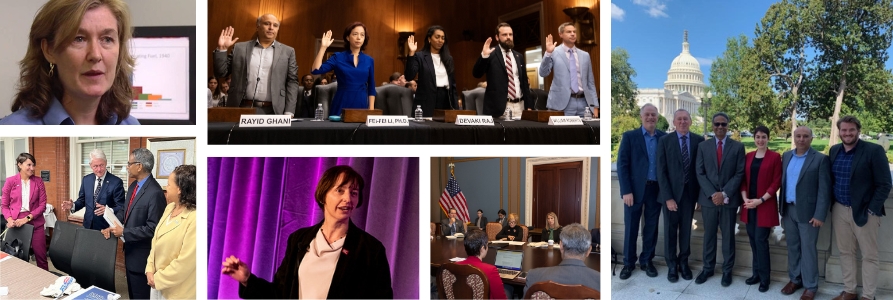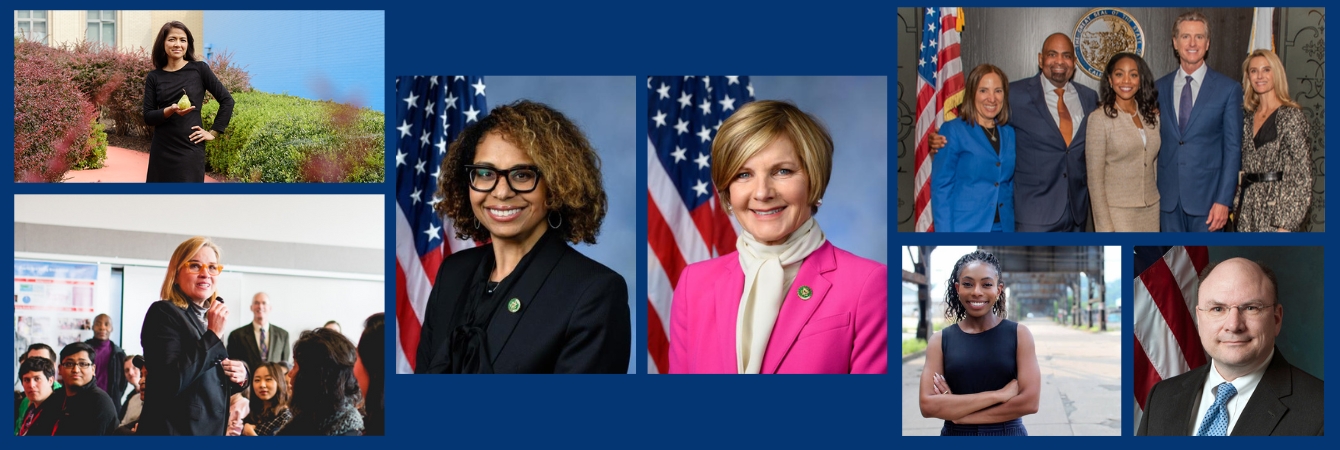Pathways To Policy Impact
From Washington, D.C., to Silicon Valley, Heinz College experts create and inform policies that will shape the future of our nation, society, and world. Our experts regularly have meaningful engagements with leaders from the City of Pittsburgh, local and county agencies, the Commonwealth of Pennsylvania, national politicians including frequently called to testify before Congress. For additional information, please see our detailed policy impact page.
FACULTY Serving in Policy Roles

- Lee Branstetter - Advisor, National Academies Sciences, Engineering, and Medicine's ad-hoc committee that examines the security of the U.S. medical product supply chain
- Jon Caulkins - Advisor, National Academies Division on Engineering and Physical Sciences (current), serves on the Scientific Advisory Committee for the United Nations Office on Drugs and Crime, advisor - National Academies Behavioral, Social Science, and Education (former)
- Avi Collis - Appointed to Federal Economic Statistics Advisory Committee (FESAC), advises the Directors of the Department of Commerce, BEA, Census, and BLS
- Martin Gaynor - Special Advisor, U.S. Department of Justice (DoJ); (former) Director of the Bureau of Economics at the U.S. Federal Trade Commission; Member of Pennsylvania Helath Care Cost Containment Council and the Governor's Health Advisory Council; Member of the National Academy of Medicine and the National Academy of Social Insurance
- Ramayya Krishnan - Appointed to U.S. Department of Commerce’s National Artificial Intelligence Advisory Committee (NAIAC), AI Futures working group Chair, CDAO RAI Council Chair, Atlantic Council's landmark report on Geopolitical Impacts of New Technologies and Data, commissioned by Congress and co-chaired by Senators Mark Warner (VA) and Rob Portman (OH), with Representatives Suzan DelBene (WA) and Michael McCaul (TX), and Fellow of the American Association for the Advancement of Science
- Kristen Kurland - Chair of the Geographical and Geospatial Sciences Committee of the National Academies of Sciences, Engineering, and Medicine, and member of the Board on Earth Sciences and Resources, National Academy of Sciences
- Daniel Nagin - Elected to the American Academy of Arts and Sciences and the National Academy of Sciences
- Rema Padman - National Academies panel on Digital Literacy, Chair AI & Healthcare Symposium
POLICY MEMOS, WHITEPAPERs, REPORTS
Our policy memos, whitepapers, and reports delve into pressing policy questions that impact society at multiple levels, drawing on rigorous and evidence-based research.
Noteworthy Speeches, Roundtables & Convenings
From high-profile sessions like hosting Assistant Attorney General on U.S. HealthCare to launching the National Academies report via the Block Center or engaging with industry at our AI policy roundtable with Highmark Health, we contribute to timely conversations that shape public policy. These gatherings bring together leading voices, fresh research, and real-world implications—all in one room.
RECENT Awards & Affiliations
- Karen Clay Editor of Journal Explorations in Economic History
- Rayid Ghani & David Steier named Academic Data Leaders by Chief Data Officer Magazine
- Chris Goranson, 125th Anniversary Fellow Penn State’s College of Earth and Mineral Sciences
- Akshaya Jha, named a Faculty Research Fellow, National Bureau of Economic Research and Energy Fellow, Wilton E. Scott Institute for Energy Innovation
- David Krackhardt, Distinguished Scholar Award, Academy of Management
- Anna Mayo, Early Career Award, Interdisciplinary Network for Group Research
- Rema Padman, Bufalini Prize in the Health Technologies Sector, INFORMS Health Applications Section Distinguished Speaker Award
- Denise Rousseau, Lifetime Career Award, Academy of Management
- Ananya Sen, Andrew Carnegie Fellows (Class of 2024)
- Michael D. Smith, INFORMS - ISS Distinguished Fellow Award
- Michael D. Smith & Rahul Telang, INFORMS - ISS Practical Impacts Award
- Lowell Taylor, National Institute for Health Care Management (NIHCM) Research Award
- Al Blumstein (emeritus) won the National Consortium for Justice Information and Statistics’ O.J. Hawkins Award for Innovative Leadership and Outstanding Contributions in Criminal Justice Information Systems, Policy and Statistics
Alumni Leading through Policy, public Service, & Societal Impact

- Greg Bednarski - Senior Executive, National Security Agency (current); Chief of Cybersecurity & Strategy, National Security Agency (2016-2017)
- Keith Block - Founder and CEO of Smith Point Capital (current); CEO of Salesforce (2013-2020)
- Sen. Sean Bowie - Arizona State Senator for District 18 (2016-2022)
- Malia Cohen - California State Controller (current)
- E.G.P. Haran - Public health expert, part of the global fight to eradicate polio, worked for the World Health Organization, Rotary International, and USAID
- C. David Hassell - Secretary of Revenue for Pennsylvania (2017 - 2022)
- Joseph Hezir - Former CFO for the U.S. Department of Energy (2014 - 2017)
- Rep. Sydney Kamlager-Dove - U.S. Representative for California's 37th Congressional district (current)
- Rep. Susie Lee - U.S. Representative for Nevada's 3rd Congressional district (current)
- Leah Lizarondo - CEO and Cofounder of 412 Food Rescue (current)
- Karl Maschino - Chief Financial and Administrative Officer of the U.S. Government Accountability Office (2014 - 2024)
- Rep. La'Tasha D. Mayes - Pennsylvania Representative for District 24 (current)
- Rep. Lindsay Powell - Pennsylvania Representative for District 21 (current)
- David Radzinowski - Chief Financial Officer at NASA (2014 - 2017)
- Meredith Reynolds - Deputy City Manager, City of Long Beach, California (current)
- Carmen Yulín Cruz - Mayor of the city of San Juan, Puerto Rico (2013-2020); member of the House of Representatives in Puerto Rico (2009 - 2013)